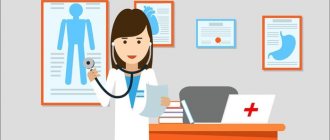In general, during employment, the employer does not have the right to demand from a new employee more documents than are prescribed in the Labor Code (Article 65). An exception is cases when special documents are required for registration: a certificate of absence of disqualification, a diploma of education, a certificate or certificate of qualifications, a certificate of health.
In particular, when applying for employment, minor applicants undergo a mandatory medical examination. The Labor Code provides similar conditions for catering workers associated with traffic and engaged in hazardous work. The Code says that requirements for a preliminary or periodic medical commission may be specified in other regulations. For example, for teaching staff they are provided for by the Law on Education No. 273 Federal Law (clause 9, clause 1, article 48).
Need for a medical examination
It should be noted that not only profession and position determine the need for a health check, but also other factors:
- Difficulty of work (physical activity, static posture).
- Presence of harmful and (or) hazardous production factors:
- biological (allergens, dust, toxins, poisons);
- chemical (pesticides, acids, gases);
- physical (radiation, electromagnetic field, vibration).
- Difficult conditions (altitude, difficult climatic conditions, especially responsible work: rescuers, firefighters, crane operators, when the presence of health problems can adversely affect the life and health of other people).
Important! More detailed information is in the List approved by Order No. 302n dated April 12, 2011 (hereinafter referred to as the List).
A special assessment of working conditions (SWA) identifies harmful factors and determines which workers will have to undergo regular medical examinations.
If your organization has recently been registered and jobs have just been created, then you have a year to conduct an SOUT. However, you shouldn’t wait that long, because the employer’s obligations and the right to benefits arise by law upon employment or performance of relevant work, and not after receiving special assessment data.
Who needs to undergo a medical examination when applying for employment?
There are certain categories of employees for whom undergoing a medical examination is predetermined by current legislation, for example, for the following:
- Drivers must undergo a drug addiction treatment and a psychologist;
- personnel employed in enterprises with harmful and dangerous working conditions (Part 1 of Article 213 of the Labor Code of the Russian Federation) - the harmfulness factor is determined by a special assessment. At the same time, the lists of harmful and dangerous work are indicated in the Order of the Ministry of Health and Social Development of Russia dated April 12, 2011 No. 302n;
- office workers forced to spend more than half of their working time at the computer - annually;
- employees of catering establishments - registration of a medical book (Part 2 of Article 213 of the Labor Code of the Russian Federation);
- employees of food enterprises - registration of a medical book (Part 2 of Article 213 of the Labor Code of the Russian Federation);
- personnel working in direct contact with children - teaching staff of preschool and school institutions, including temporary groups (Part 2 of Article 213 of the Labor Code of the Russian Federation);
- employees of consumer services - bath and laundry complexes, hairdressers, beauty salons, etc. (Part 2 of Article 213 of the Labor Code of the Russian Federation);
- medical staff - clinics, laboratories, hospitals (Part 2 of Article 213 of the Labor Code of the Russian Federation).
In addition, minor employees and personnel seconded to the Far North and areas with similar conditions undergo medical examinations.
Important! Territorial self-government bodies may establish additional conditions for undergoing a medical examination for certain categories of employees.
If an applicant refuses to undergo a medical examination, the employer has the right to refuse employment, because The medical examination is preliminary and is carried out upon concluding an employment contract (Article 69 of the Labor Code of the Russian Federation).
To refer an applicant for a preliminary medical examination, the organization issues an individual referral in a form approved by the organization itself. The referral contains the following data: full name of the person, place of work, place in the list of places and professions for which a medical examination is required, if necessary, harmful and hazardous production factors are indicated.
How an ordinary job can become harmful
If you think that there are no harmful factors in the office, this is a mistake. The List contains subclause 3.2.2.4., which calls working with a PC more than 50% of the working time a harmful factor.
Office workers spend most of their time at the computer: managers, accountants, especially programmers and system administrators. In 2021, the Ministry of Labor was going to make changes to the List and exclude the item on computers from the list, because machines are being improved and now their effect on vision is not the same as before.
This is just a draft for now, so the rule remains in effect until changes are made. However, officials believe that the results of the SOUT also need to be taken into account. If working conditions for a specific workplace (several similar places) are considered acceptable or optimal, then medical examinations may not be carried out, because it turns out that there is no harmful influence.
True, their opinions further diverge: should we recognize as safe all such workplaces in general or only those where working time on a computer takes up less than 50%. Judicial practice in this sense is also contradictory. To avoid disputes, it is still recommended to conduct medical examinations.
For an interview with a certificate
Procedure if a candidate comes to you for a job and needs to undergo a preliminary medical examination:
- Specify the applicant's intended position.
- Check internal documents and lists of workplaces with mandatory medical examinations; if they are missing, you will have to check the List.
- Issue a referral for a medical examination. It indicates the exact name of the position, with the group, category, rank. You will also need a link to the List item - it is necessary to clarify which factors are present in the work. The composition of the medical commission depends on this.
- The candidate goes through a commission, and if the company does not have a concluded agreement with a specific medical institution, then the employee himself chooses the place and provides the result to the potential employer.
Note! It is difficult for a non-specialist to determine the presence of harmful or dangerous factors. An accountant or HR officer should contact the person responsible for occupational health and safety (in a small organization this may be a manager who has undergone appropriate training) for clarification and instructions on whether to require a certificate from the employee or not.
If the examination was successful and there are no contraindications, then you can register the employee. More details in the article at the link.
Compensation for medical examination
According to the provisions of Articles 212 and 213 of the Labor Code of the Russian Federation, the employer is obliged to compensate the employee for the costs of conducting a medical examination in full.
This practice is used in cases where the applicant has passed a medical examination on his own or has received a referral for a medical examination through the human resources department. Reimbursement is made on the basis of an employee’s application, which is certified by the head of the enterprise or another authorized person.
Download for viewing and printing:
Article 213 of the Labor Code of the Russian Federation “Medical examinations of certain categories of workers”
What to do if payment for a medical examination is not provided
The list of professions for which passing a medical commission is mandatory is determined by labor legislation.
However, this legal act provides that self-government bodies may introduce additional conditions for undergoing a medical examination. If the position for which the applicant is applying requires passing a medical commission, this will have to be done in any case. It does not matter that this requirement is not spelled out in labor legislation, but is provided for by the internal charter of the enterprise.
In any case, if the employer insists on undergoing a medical examination, he is obliged to reimburse the expenses incurred. Let us note that if the profession is not included in the list, is not specified in the company’s internal documents for passing a medical examination, and the employer does not insist on an examination, he is released from the obligation to compensate for expenses. This happens if a future employee undergoes a medical examination on his own.
Payment Methods
The law does not regulate how expenses are reimbursed, so compensation for a pre-employment medical examination is usually made as follows:
- In fact. The employee passes the commission independently, after which he submits to the accounting department of the enterprise an application certified by the employer for reimbursement of the specified amount;
- Preliminary agreement. The employer sends the applicant to undergo a medical examination, drawing up a statement of subsequent reimbursement of expenses;
- Agreement. Here, an agreement is concluded between the company and the medical institution, on the basis of which referred employees undergo medical examinations free of charge (Clause 2.3 of the Methodological Basis for Preliminary and Periodic Medical Examinations of Persons Working in Harmful and (or) Dangerous Working Conditions, approved by the Ministry of Health and Social Development of Russia on December 14, 2005) .. This option is preferred for job seekers and employers. The former do not incur financial costs during employment, the latter receive a discount.
Important! The law does not provide for reimbursement periods, so it is a mistake to assume that the employer will reimburse the costs immediately after hiring a new employee. Typically, accounting includes this amount in the first payment due to the employee: advance or salary.
Hiring expenses
The costs of medical examination of candidates are taken into account in accounting as normal expenses for core activities, in the corresponding accounting accounts:
D 20 (26,23,25,44) K 76(60)
In tax accounting (for the purposes of calculating income tax or single tax under the simplified tax system), expenses are also accepted (see paragraphs 7 and 8, paragraph 1, Article 264 of the Tax Code of the Russian Federation and paragraph 5, paragraph 1, Article 346.16 of the Tax Code of the Russian Federation). In particular, according to the simplified tax system, according to the explanations of the Ministry of Finance, these costs are included in material costs, as part of the production process.
It doesn’t matter whether the candidate was selected or not, even if the results of the medical examination turned out to be unacceptable for hiring, they can be taken into account. Although some controversy is caused by the situation when a potential employee independently enters into an agreement for a medical examination and then presents documents to reimburse him for such costs.
In most cases, tax authorities and courts recognize that the employer is required by law to bear these costs, so reimbursing the employee for expenses does not lead to the formation of income subject to personal income tax and contributions. I note that compensation is possible if the employee himself applies for it. The main thing is that the organization conducting the medical examination has a license, and the employee provides an agreement, documents on payment and provision of services. For an organization, expenses can be accepted into accounting on the basis of acts of services rendered, but for tax accounting using the simplified tax system, the fact of payment is important.
Note! From July 1, 2021, the cash receipt must indicate the name of the buyer (customer), his tax identification number and some other details (clause 6.1, article 4.7 of Law 54-FZ), if the settlement is made with an organization (individual entrepreneur), including through an accountable face.
Another reason not to pay fees for a candidate is the lack of an employment relationship. Since an individual is not an insured person, there is no need to pay contributions.
NTVP "Kedr - Consultant"
LLC "NTVP "Kedr - Consultant" » Services » Legal consultations » Labor disputes » On compensation of expenses for the initial medical examination incurred by an applicant who is not employed in the organization
The applicant passed the initial medical examination, but was not employed by the organization.
Question
Should the organization reimburse his expenses for a medical examination at his request?
Lawyer's answer
If the employee has undergone a preliminary medical examination, the employer is obliged to reimburse his expenses, regardless of whether an employment contract was subsequently concluded.
{Question: The organization has stipulated in local regulations that a preliminary medical examination when hiring an employee is carried out at the employee’s expense. Subsequently, the organization will reimburse the employee’s expenses for undergoing a medical examination, provided that the employee enters into an employment contract with it. This condition was adopted by the organization in order not to incur unnecessary financial costs for candidates who, for health reasons, cannot undergo a medical examination or who passed it but got a job with another employer. Are the terms of the local act of the organization legal? (Expert Consultation, 2013) {ConsultantPlus}}
In accordance with the provisions of Art. 213 of the Labor Code of the Russian Federation, workers engaged in work with harmful and (or) dangerous working conditions (including underground work), as well as in work related to traffic, undergo mandatory preliminary (upon entry to work) and periodic (for persons under the age of 21 - annual) medical examinations to determine the suitability of these workers to perform the assigned work and prevent occupational diseases. In accordance with medical recommendations, these employees undergo extraordinary medical examinations.
Art. 213, “Labor Code of the Russian Federation” dated December 30, 2001 N 197-FZ (as amended on July 29, 2017) {ConsultantPlus}
Preliminary and periodic examinations can be carried out by medical organizations that have a license that gives the right to perform work (services) for these examinations, as well as to examine professional suitability (clause 4 of the Procedure for conducting mandatory preliminary (upon employment) and periodic medical examinations ( examinations) of workers engaged in heavy work and in work with harmful and (or) dangerous working conditions, approved by Order of the Ministry of Health and Social Development of Russia dated April 12, 2011 N 302n (hereinafter referred to as the Procedure), clause 46 part 1 article 12 of the Federal Law dated 04.05 .2011 N 99-FZ “On licensing of certain types of activities”).
The employer is obliged to enter into an agreement with such an organization, after which he will be able to send applicants for a preliminary medical examination (clause 2.3 of the Methodological basis for conducting preliminary and periodic medical examinations of persons working in harmful and (or) dangerous working conditions. Methodological recommendations approved by the Ministry of Health and Social Development of Russia 14.12 .2005).
To undergo a preliminary medical examination (examination), the employer issues a referral to the applicant against signature (clause 7 of the Procedure).
According to Art. 213 of the Labor Code of the Russian Federation, preliminary and periodic medical examinations are carried out at the expense of the employer. At the same time, the Labor Code of the Russian Federation does not contain any reservations in the case when the employee bears the expenses on his own, unless an agreement was subsequently concluded with the employer.
Thus, if the employee has undergone a preliminary medical examination, the employer is obliged to reimburse his expenses, regardless of whether an employment contract was subsequently concluded.
{Question: The organization has stipulated in local regulations that a preliminary medical examination when hiring an employee is carried out at the employee’s expense. Subsequently, the organization will reimburse the employee’s expenses for undergoing a medical examination, provided that the employee enters into an employment contract with it. This condition was adopted by the organization in order not to incur unnecessary financial costs for candidates who, for health reasons, cannot undergo a medical examination or who passed it but got a job with another employer. Are the terms of the local act of the organization legal? (Expert Consultation, 2013) {ConsultantPlus}}
Selection of documents:
Question: ...How long must the employee be reimbursed for the costs of a preliminary medical examination? Is it possible not to reimburse expenses if the employee does not complete the probationary period? (Expert Consultation, 2017) {ConsultantPlus}
Question: Based on the results of a mandatory preliminary medical examination, a candidate for a vacant position was denied an employment contract due to medical contraindications. In this situation, does an unsuccessful employer have the right to refuse to reimburse a candidate for a vacant position the costs of undergoing a mandatory preliminary medical examination? (Expert Consultation, 2012) {ConsultantPlus}
The explanation was given by Igor Borisovich Makshakov, legal consultant of LLC NTVP Kedr-Consultant, October 2017.
When preparing the answer, SPS ConsultantPlus was used.
This clarification is not official and does not entail legal consequences; it is provided in accordance with the Regulations of the CONSULTATION LINE (
Routine medical examinations and their recording
If the company has passed the SOT and there are lists of those positions and workplaces where employees are required to undergo regular medical examinations, then you can draw up a schedule for their implementation and coordinate it with the medical organization chosen to conclude the contract. The frequency depends on the assignment of work or factors to a particular item on the List.
With a permanent contract, you will have to follow a certain procedure:
In accounting and tax accounting, routine examinations are taken into account in the same way as during employment. Payments are only more often made by bank transfer, and the organization is given supporting documents with transcripts of who, from which specialists, with what result, and for what amount the inspection was carried out.
This will allow you to correctly post costs, which is especially important when it comes to multiple taxation systems. For example, some workers are engaged in retail trade, transferred to UTII, and some are engaged in the provision of services to OSNO or simplified tax system. The costs will have to be divided accordingly.
Note! Only expenses for mandatory medical examinations can be accepted for calculating the tax base. If an employer sends employees to medical examinations at their own request, then payments for them cannot be taken into account in the NU.
Tax authorities will insist on taxing such amounts of non-mandatory medical examinations with personal income tax and contributions, because They consider them a benefit to the employee. After all, such compensation is not listed as non-taxable in Article 422 of the Tax Code of the Russian Federation. The courts do not agree with this position and side with the workers.
Who pays for the medical examination when applying for a job?
The procedure for paying for a medical examination is not described by the legislator. The entrepreneur is obligated to pay for the examination of a candidate for a position or an existing employee. There are two options:
- An organization that requires an employee enters into an agreement with a medical center to conduct medical examinations, where candidates will be sent. This includes regular health checks.
- The applicant pays for a medical examination in a public or private company, receives confirmation receipts, on the basis of which the employer returns the money spent.
Important: the employer pays for all mandatory medical examinations.
Doctors' services are paid for by the enterprise employing employees; there are no exceptions to this rule. If, as a result of the preliminary examination, it turns out that the applicant is unsuitable for the job for which he applied, the employer will still bear the costs.
What categories of employees qualify?
A complete list of work requiring monitoring of the mental and physical condition of personnel is contained in Order of the Ministry of Health No. 302-n dated April 12, 2011. The legislator lists the following categories:
- those employed in harmful and dangerous industries - a person comes into contact with caustic, chemical, toxic substances, the work involves actions at heights, at high or low temperatures;
- working underground, transport managers - such people are subject to inspections from one to several times per shift;
- those involved in the upbringing and training of children related to food preparation - the requirements are established to prevent epidemics;
- minor workers undergo commissions annually.
A specialist performing professional duties on a computer is considered to be working in hazardous conditions.
Primary medical examination upon employment
When hiring, an entrepreneur cannot require medical certificates, expert opinions or other evidence of good health from candidates. Exceptions are cases described by law.
The future employee receives a referral from the company for a medical examination. It may indicate institutions collaborating with the company. The results of the examinations are documented in a certificate or medical record. The latter is issued only to those wishing to work whose health meets the requirements. If a person is not allowed to perform duties, he receives written notice of this.
Personal medical records are protected from counterfeiting, are issued as necessary and are ordered by employers as needed. They include information about the owner - full name, health courses attended and doctors' records. The document confirms the normal state of the employee, and its falsification is punishable by the state.
After the doctors’ conclusion, the organization accepts the applicant for work.
If it is not provided by law
If the performance of professional duties involves unique equipment or observation of objects, the employer may refer the applicant to a medical examination, which he will pay for himself.
For example, if a person will need to handle small objects, good vision is necessary. In this case, internal orders and instructions of the company must apply. Otherwise, the requirement to undergo a medical examination will be illegal.
The state does not prohibit entrepreneurs from checking the health status of workers in order to avoid occupational diseases and accidents. Such measures must be documented by a doctor’s opinion.
Requirements to bring certificates from any specialists are illegal. They can be appealed to supervisory authorities or court.
Waybills
The biggest problem for any organization that owns or leases vehicles is waybills. Filling them out causes dissatisfaction and discomfort among drivers and irritates both managers and accountants who are forced to tinker with large amounts of data.
However, this is the main document for confirming (directly or indirectly) such expenses as:
- fuels and lubricants (fuel, oils);
- related products (antifreeze, washer fluid);
- travel to the place of business trip, shift, regular work, flight, transportation, etc.;
- repair and purchase of auto parts;
- vehicle maintenance – washing, diagnostics, tire fitting;
- drivers' wages;
In addition, accounting maintained on the basis of vouchers helps to identify drivers who use the organization’s property for other purposes:
- travel on personal business (number of kilometers on the odometer);
- drain gasoline (discrepancies in filling data, refueling data and fuel residues);
- attach “wrong” receipts (discrepancy between tank volume, fuel consumed and submitted documents).
In short, waybills serve good purposes, but maintaining them is burdensome. Not least because of the need to make notes about undergoing a medical examination.
Important! The obligation to mark a medical examination is specified in paragraph 7 of Art. II Order of the Ministry of Transport No. 152 of September 18, 2008. This is part of the driver's information.
This is especially strict in passenger transport, because the responsibility here is much higher. If the company does not have a full-time physician, then again you will have to enter into an agreement and constantly use the services of a medical institution. Usually the examinations are quick: the doctor checks your general well-being, blood pressure level, pulse rate, and temperature.
Why did I dwell in detail on the purpose of waybills? As you understand, they are necessary to confirm a number of expenses of the organization. Even if compensation is simply paid for the use of the employee’s personal transport and no costs are separately reimbursed, the very use of the car for work purposes must be confirmed.
Since part of the mandatory details of the voucher is a medical examination note, its absence may attract the attention of tax authorities. They will question the validity of such a document and may try to withdraw the corresponding costs from it to NU.
The courts, however, here too are loyal to taxpayers and restore the right to take costs into account.
FSS: how to report and receive compensation
The special assessment is reflected not only in the declaration submitted to Rostrud, but also in the 4-FSS report (Table 5), starting from the first quarter of 2021. Medical examinations are shown in a separate row in the same table. Until the new year, this data remains unchanged, because... values are set at the beginning of the year. When sending the calculation for the 1st quarter of 2021, do not forget to check whether changes have occurred and fill out the table.
In order to reimburse its costs for mandatory medical examinations, the employer applies to the Social Insurance Fund for appropriate funding (the Rules were approved by Order of the Ministry of Labor No. 580n dated December 10, 2012).
Important! The application must be submitted this year before August 1 (i.e., July 31 inclusive). The deadline for 2021 has already expired, now you can use the benefit only in 2021 and the sooner the better, because the Fund may refuse to provide funding if budget funds are exhausted.
The calculation of the amount that the Social Insurance Fund will reimburse (allocate) is made based on data from the previous calendar year using the formula:
(Accrued contributions for injuries - expenses for paying for “accidental” sick leave and vacations for the period of treatment and travel to the place of treatment in addition to regular annual leave) x 20%
An insured who takes care of pre-retirees and allocates additional funds for their sanatorium-resort treatment can count on 30%.
For enterprises that did not apply for financing in the previous two years and whose staff does not exceed one hundred people, more favorable conditions have been established. They can make calculations not from one previous year, but from three previous years at once. However, the amount of assistance should not be higher than the amount of contributions for the current year.
For reimbursement you will need (the list is relevant for financing for medical examinations): an application, a plan for preventive measures and their financing for the current year (originals), lists of measures to improve working conditions and labor protection (based on the results of the special assessment of labor protection) and a list of employees subject to medical examinations in the current year year in the form of copies, an agreement with a licensed medical organization and its license (copies).
Note! Some branches will ask you to duplicate certain documents electronically by email or through informal correspondence via TKS.
When the FSS gives the go-ahead, the policyholder will have to submit a quarterly report on the use of contribution amounts in addition to the 4-FSS calculation. Additionally, you will need copies of reports from medical commissions and information from them, as well as copies of payment and other documents confirming payment for medical examinations and actual receipt of services (invoices, payment orders, cash receipts, acts).
So far, interaction with the FSS via telecommunication channels, excluding reporting submission, has not been established, so most of the documents will have to be carried personally (if you are sending a representative or a responsible person - not a manager, then do not forget to give him a power of attorney). You can also use the State Services website.







